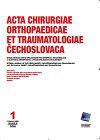用Y平衡测试评估青少年奥斯古德-施拉特病运动员的膝关节稳定性。
IF 0.4
4区 医学
Q4 ORTHOPEDICS
Acta chirurgiae orthopaedicae et traumatologiae Cechoslovaca
Pub Date : 2023-04-01
DOI:10.55095/achot2023/015
引用次数: 0
摘要
研究目的奥斯古德-施拉特病继发于慢性髌腱过载。本研究旨在确定与对照组的健康受试者相比,患有奥斯古德-施拉特病的运动员在Y平衡测试中的表现是否明显较差。材料和方法本研究涉及10名男孩(平均年龄13.7岁)。7名参与者出现双侧膝盖疼痛、肿胀和压痛,3名参与者出现单侧膝盖疼痛、溶胀和压痛(2例为左膝,1例为右膝)。总共评估了17个膝盖(左膝9例,右膝8例)。10名健康的青少年职业足球运动员(平均年龄14.6岁)被选为对照组。在这两组中,使用Y平衡测试评估复杂的膝关节稳定性,并使用Plisky等人开发的方法分析其数据。测试结果用左右下肢的指数(归一化)值表示,并比较各个方向的平均值。结果两组在后内侧和后外侧方向上有显著差异。结论使用Y平衡测试,我们的研究记录了OsgoodSchlatter病患者在上述方向上的表现下降。关键词:奥氏病,膝关节,平衡测试,运动模式,髌腱过载。本文章由计算机程序翻译,如有差异,请以英文原文为准。
Assessing Knee Stability in Adolescent Athletes with Osgood-Schlatter Disease Using the Y-Balance Test.
PURPOSE OF THE STUDY Osgood-Schlatter disease develops secondary to chronic patellar tendon overloading. The present study was designed to determine whether athletes with Osgood-Schlatter disease perform significantly worse in the Y-Balance Test compared to healthy subjects in a control group. MATERIAL AND METHODS The study involved ten boys (average age 13.7 years). Seven participants had bilateral knee pain, swelling and tenderness whereas three had unilateral knee pain, swelling and tenderness (left knee in two cases, and right knee in one). Overall, 17 knees were assessed (left knee in nine cases and right knee in eight).Ten healthy adolescent professional football players (mean age 14.6 years) were selected as a control group. In both groups, complex knee stability was assessed using the Y-Balance Test and their data were analyzed using the methodology developed by Plisky et al. The test outcome was expressed in indexed (normalized) values for the right and left lower extremities, and averaged values for the individual directions were compared. RESULTS Significant differences between both groups were shown in the posteromedial and posterolateral directions. CONCLUSIONS Using the Y-Balance Test, our study documented reduced performance in the above directions in patients with OsgoodSchlatter disease. Key words: Osgood-Schlatter disease, knee, balance test, movement patterns patellar tendon overload.
求助全文
通过发布文献求助,成功后即可免费获取论文全文。
去求助
来源期刊
CiteScore
0.70
自引率
25.00%
发文量
53
期刊介绍:
Editorial Board accepts for publication articles, reports from congresses, fellowships, book reviews, reports concerning activities of orthopaedic and other relating specialised societies, reports on anniversaries of outstanding personalities in orthopaedics and announcements of congresses and symposia being prepared. Articles include original papers, case reports and current concepts reviews and recently also instructional lectures.

 求助内容:
求助内容: 应助结果提醒方式:
应助结果提醒方式:


